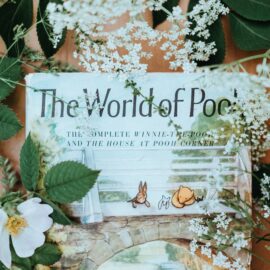

This article is an excerpt from the Shortform book guide to "Eight Dates" by John Gottman, Julie Schwartz Gottman, et al.. Shortform has the world's best summaries and analyses of books you should be reading.
Like this article? Sign up for a free trial here.
What’s the key to making relationships last? What are the eight dates you should go on with your partner?
While there’s no guarantee of happily ever after, the authors of Eight Dates argue that there’s a secret to a healthy, long-lasting relationship—make time for your partner and stay curious. They also explain why weekly dates are important for sustaining a strong relationship.
Read below for a brief Eight Dates book overview.
A Breakdown of Eight Dates
The Eight Dates book is a resource for building a stronger relationship with your partner by committing to always learning about who they are and who they’re becoming, starting with eight powerful dates.
Eight Dates is co-authored by couples John Gottman and Julie Schwartz Gottman, and Doug Abrams and Rachel Carlton Abrams. John Gottman and Julie Schwartz Gottman are best known for their work as founders of The Gottman Institute, a research and therapy center focused on strengthening relationships and preventing divorce. Their research inspired them to develop The Gottman Method, a widely used approach to relationship counseling. The couple has written multiple books together, including The Love Prescription, 10 Lessons to Transform Your Marriage, and And Baby Makes Three.
Rachel Carlton Abrams, a physician and the author of BodyWise, is best known for her work in integrative women’s health and sexuality. Her husband, Douglas Abrams, is an author, editor, and founder of the literacy agency Idea Architects; he has co-authored several books with notable personalities, including The Book of Joy, written in collaboration with His Holiness the Dalai Lama and Archbishop Desmond Tutu, and The Book of Hope, written with Jane Goodall.
The Secret to a Long and Loving Relationship: Never Stop Dating
There’s no magic equation of compatibility that guarantees that you and your partner will stay together. However, the authors argue that there’s a tried and true way to make sure your relationship grows stronger over time. Relationships last when both people support the evolution and growth of their partner, as individuals and as a couple. The authors argue that to support each other’s growth, you and your partner need to set aside time to continue learning about each other through intentional conversation and open-ended questions.
While there are many ways to learn about your partner, the authors advocate for the power of a weekly date night. They define a date as a designated time that you get together with your partner to connect, talk, and learn more about one another (watching Netflix on the couch together doesn’t count).
Prioritize Date Night
When your life is busy with work, family, and daily logistics, date nights often feel like a luxury. According to the authors, the most common barriers couples cite are money, child care, and time.
If money feels like a barrier, remember that date nights don’t need to be expensive. The authors suggest getting creative and brainstorming free and low-cost date options, like meeting up at a cafe, taking a walk in a park, or even snuggling up on the couch at home. You just need a place where you’re able to focus on each other.
If you have children, you can explore out-of-the-box and inexpensive child care options. For example, find a group of families willing to take turns babysitting each other’s kids, ask a trusted friend or family member to babysit, or just have a date night at home after the kids are in bed.
Finally, the authors acknowledge that many people already feel like there aren’t enough hours in the day. But the authors emphasize that people make time for the things that matter most to them. So if your relationship is on that list, they strongly suggest prioritizing a weekly date night no matter what.
Listen With Curiosity
Once you’ve set aside time for date night, make sure you use this time to learn more about your partner. The authors argue that learning more about your partner will depend on your ability to listen effectively. The goal of listening should be to better understand the other person.
Here are some strategies you can use to make sure you’re listening to learn:
Pay attention. First, put away your phone and other distractions. Stay present in the conversation. Then fully listen to what your partner is saying without judgment.
Remain curious. If you don’t understand something, ask more questions.
Reflect back what you hear your partner say. Repeating back what you hear lets your partner know that you understood them correctly.
Stay connected. If the conversation gets tense or challenging, find other ways to connect. Express empathy for your partner’s experience and stay connected with physical touch.
The Eight Essential Conversations
After committing to make time to learn more about your partner on a weekly date night, where do you start and what should you talk about?
The authors outline eight conversations that they say every couple must have; topics range from sex to finances to personal aspirations. These eight conversations won’t only lay a strong foundation for your relationship—they’ll also allow you to address common sources of conflict.
The authors structure these conversations as eight possible dates, outlining the purpose of the date and offering suggestions on where to go and questions to guide the conversation. In the following sections, we’ll explore the theme of each date, explain why it’s important, and provide a few date ideas to spark inspiration.
Date One: Trust
Trust is foundational to a long-lasting relationship. The authors define trust as the conviction that your partner values you and will be there to support you. The goal of this date is to understand your partner’s beliefs about trust and discuss how you can deepen trust in your relationship.
There are a number of ways you can build—or break—trust in your relationship. The authors argue you can build trust by being vulnerable with your partner, remaining faithful, addressing conflict, offering compassion, and expressing gratitude for your partner. You break trust when you fail to show affection, follow through, tell the truth, or be available when your partner needs you.
Use the following questions to help guide your conversation:
- What did you learn about trust growing up? How do you define trust now?
- Where do we agree on issues of trust? Where do we disagree?
- How can we strengthen trust in our relationship? What do you need from me?
Date Two: Disagreements
The next date is about disagreements. The authors emphasize that disagreements in a relationship are normal. In fact, when you know how to manage disagreements effectively, it can even strengthen your relationship. The goal of this date is to learn how your partner manages disagreements and how you can manage disagreements more effectively as a couple.
The authors differentiate between two types of problems that cause tension in a relationship. The first type of problem are those that can be resolved. These are often surface-level problems about what to eat for dinner or who should walk the dog. They’re only about the topic at hand and don’t hide any bigger underlying issues. The second type of problem are ones that will never be resolved (what the authors call “perpetual problems”). These problems are rooted in core differences between you and your partner based on your values or life experiences. Research has shown that most conflicts fall into this second category.
Regardless of the type of disagreement you’re having, the key to a healthy relationship isn’t avoiding conflicts but resolving them effectively, meaning you approach each disagreement as an opportunity to increase your understanding of the other person—not as an opportunity to win.
Use the following questions to help guide your conversation:
- What did you learn about conflict or managing conflict growing up? How have you navigated conflict in the past?
- What are your beliefs about anger? What do you need when you’re feeling angry?
- How would you like to manage conflict differently in the future?
Date Three: Sex
The authors argue that a healthy sex life is important to the long-term health of your relationship. However, they emphasize that there isn’t one definition of a healthy sex life. It will look different for every couple, and it will look different at different points in your life. For example, you might have more sex when you first start dating or less sex if one partner is sick. In the end, a healthy sex life is whatever feels good for both you and your significant other. The goal of this date is to learn more about what turns your partner on and to discuss how to keep your relationship passionate.
The authors explain that a healthy sex life depends on honest conversation. Sex and intimacy are particularly sensitive topics for most people, which is why a lot of couples don’t talk regularly about their sex life or sexual desires. However, research suggests that couples that talk regularly about sex have better sex more often.
The authors offer a few tips for talking about sex with your partner. First, make sure you’re not doing it right before, during, or after sex. Since it’s a delicate topic, bringing it up in the moment is a recipe for disaster. Second, don’t underestimate the power of humor. Sex doesn’t have to be serious, so don’t be afraid to bring some lightness to the conversation.
Use the following questions to help guide your conversation:
- What do you like?
- When and how do you like to initiate sex?
- What can I do to improve our sex life?
Date Four: Finances
Money is another frequent source of conflict in any relationship. The authors explain that having explicit conversations about your individual and collective finances will help you get to know your partner better and more effectively anticipate and navigate areas of conflict related to money. The goal of this date is to better understand your and your partner’s relationship to money and discuss how to build a healthy financial future together.
Our relationship to money is complex, often rooted in our upbringing and deeply held values. Therefore, conflicts around money are rarely about specific spending or saving habits—they’re more often about the emotional significance we attribute to those behaviors. The goal of this date is to dig into each partner’s relationship to money.
When beginning a conversation about your finances, start by asking questions to better understand what money means to you and your partner. For example, money might mean stability and safety for one person, but it might mean freedom and spontaneity for another. Avoid making sweeping generalizations about your or your partner’s relationship to money. It’s unhelpful to categorize one person as the cheapskate and another as the spendthrift. The key is to find the balance between the joyful opportunities and the solid foundation money can provide.
Use the following questions to help guide your conversation:
- What did you learn about money growing up?
- What makes you anxious when it comes to money?
- What do you hope for your (and our) financial future?
Date Five: Family
The authors argue that different visions and definitions of family can be a dealbreaker in a relationship. The goal of this date is to understand what family looks like for you and your partner. Every person defines family differently, so it’s important to make sure you and your partner are on the same page before entering into a long-term commitment. Specifically, if you don’t have children, talk about whether you want to be parents.
Use the following prompt to guide your conversation:
- Describe your dream family.
If you’re planning on having children, ask yourself:
- What challenges can we anticipate when we bring kids into our family?
- How do you imagine me as a parent? Where do you think I’ll thrive as a parent?
- What qualities of ours do we hope to instill in our children?
If you aren’t planning on having kids, ask yourself:
- What does being a family mean for you?
- Who’s your community? How do you want to strengthen the relationships with those in your community?
Whether or not children are in your definition of family, the authors argue that the most important relationship should always be with your partner because the couple is the foundation of a family, and the other people in your life will be best served if you prioritize that relationship.
Date Six: Play
The next date is about playfulness. The authors believe that having fun is key to a happy, thriving relationship. The goal of this date is to find out what you like to do for fun and what your partner likes to do for fun and to explore how you can have fun together.
Humans are built to play. Play not only improves the mental health of individuals, but it strengthens relationships, building trust and closeness between you and your partner. However, it’s still common for people to sacrifice fun when they’re faced with other responsibilities.
Use the following questions to guide your conversation:
- What’s the most fun you’ve ever had? Share a personal experience and an experience you’ve shared with your partner.
- What’s on your bucket list?
- What can we do to make our relationship more fun?
Date Seven: Change
According to the authors, people change over time. In a relationship, it’s important to support your partner’s evolution, even if it’s different than you expected. Conflict will often arise as you or your partner changes, but individual change can strengthen and deepen a relationship when both partners take it as an opportunity to better understand the other person. The purpose of this date is to acknowledge how you and your partner have changed in your relationship and to discuss shared traditions that will keep you connected as you continue to change in the future.
Given that change is inevitable, it can be helpful to have shared traditions (or rituals of connection) that ground you and your partner in your relationship. Maybe that’s drinking coffee together in bed every morning, keeping Sabbath on Saturdays, or planning a trip every year for your anniversary. Regardless of what your traditions are, establishing these kinds of touchpoints can keep you grounded and close through life’s ups and downs.
Use the following questions to guide your conversations:
- Describe ways in which you’ve grown that you’re most proud of.
- How do you prioritize your personal growth? How can I support you?
- What traditions are important for us to establish even as our relationship continues to grow and change?
Date Eight: Aspirations
According to the authors, couples grow together, but each person also has personal aspirations. Couples who are able to affirm and support each other’s long-term goals are more likely to have a long-lasting relationship. This date is about sharing your greatest aspirations with your partner and learning about their aspirations so that you can better support each other as you pursue your dreams.
Everyone has goals and aspirations that deserve to be pursued. Affirming the goals and aspirations of your partner is a deep expression of love, even when you know that these goals will inevitably require compromise.
Use the following questions to guide your conversation:
- Do you have any aspirations you’ve let go of that you regret?
- Describe an aspiration that’s important to you. Why is it important? What would it feel like if you fulfilled this goal?
- What do you need from me to pursue your greatest aspiration?
A Lifelong Journey
The authors emphasize that these eight dates are just the start of the long journey of getting to know your partner. It’s impossible to ever know everything about another person, and that’s the wonderful thing about being in a long-term, committed relationship. There will always be more to learn, as long as you prioritize your partner and stay curious.

———End of Preview———
Like what you just read? Read the rest of the world's best book summary and analysis of John Gottman, Julie Schwartz Gottman, et al.'s "Eight Dates" at Shortform.
Here's what you'll find in our full Eight Dates summary:
- The secret to a strong, long-lasting relationship
- Why you and your partner need to make time for weekly dates
- The eight powerful dates and conversations to have at the start of a relationship






